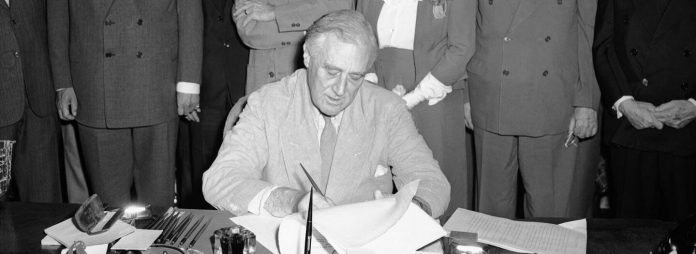On this day in 1944, US President Franklin D. Roosevelt signed the GI Bill.
Officially known as the Servicemen’s Readjustment Act of 1944, the legislation was designed to compensate returning members of the military for their service in World War II. The American Legion, a veteran’s organization, successfully fought for many of the bill’s provisions, including unemployment compensation, low-interest home and business loans, and funding for education.
The last provision was especially significant. By giving veterans financial help for tuition, living, expenses, books, supplies, and equipment, the GI Bill effectively transformed higher education in the US.
Before the war, college was an option for only 10 to 15 percent of young Americans. By 1947, in contrast, veterans made up half of the nation’s enrollment. Three years later, nearly five hundred thousand Americans graduated from college, compared with one hundred and sixty thousand in 1939.
Overcrowded classrooms and residences prompted widespread expansion and improvement in university faculties and teaching staffs. New vocational courses were developed, including advanced training in agriculture, commerce, mining, education, and fishing.
Low interest loans also enabled millions of American families to move out of urban centers and buy or build homes outside the city, transforming suburbs. The GI Bill became one of the major forces driving an economic expansion in America that lasted thirty years after the war ended.
Two transforming reasons to trust the sovereignty of God today
The GI Bill’s origin illustrates this fact: We can seldom predict the future significance of present decisions.
President Roosevelt wanted to avoid a relapse of the Great Depression after World War II ended. He could not have…
… Read More
—
Click Read More to read the rest of the story from our content source/partners – Denison Forum.



